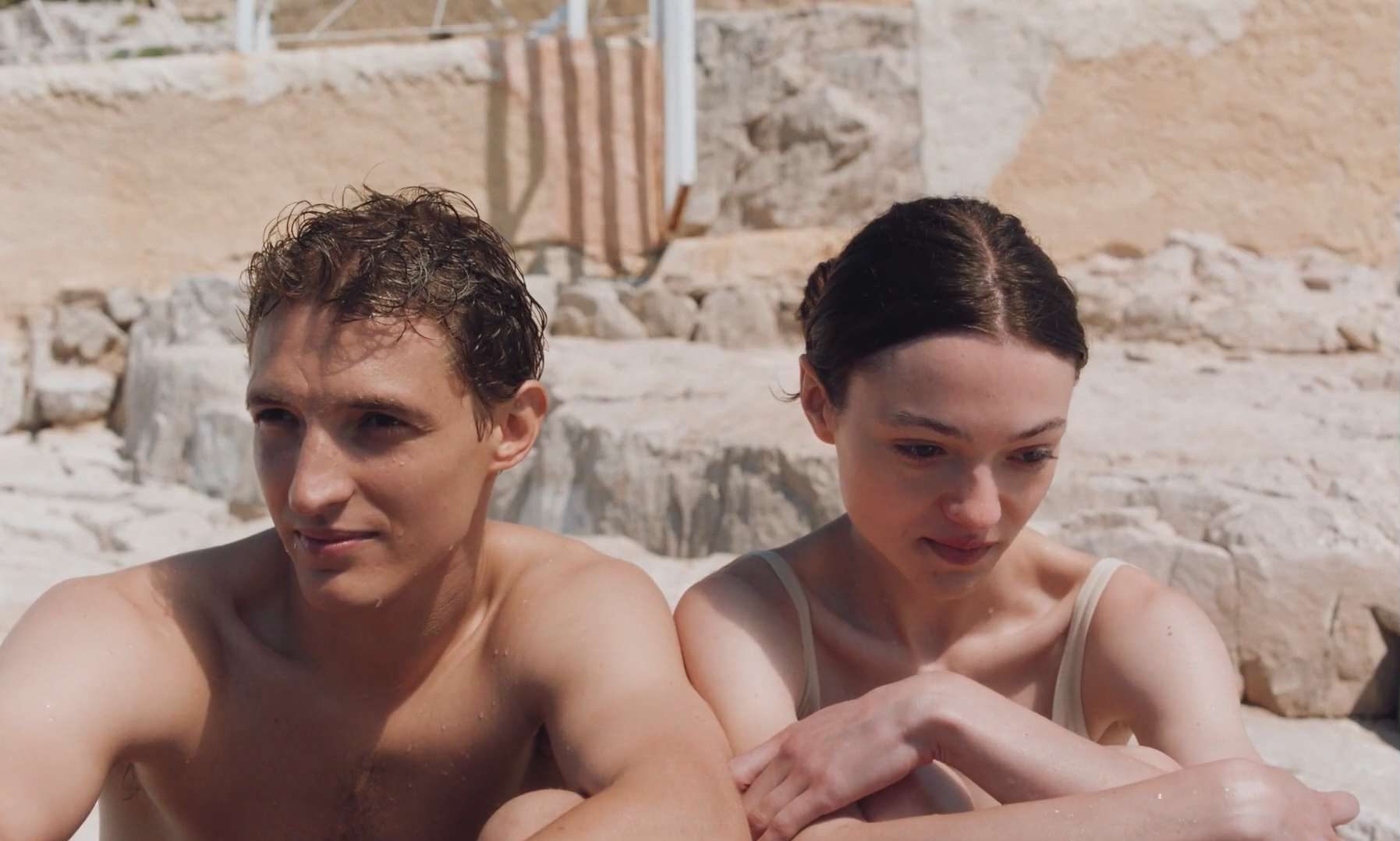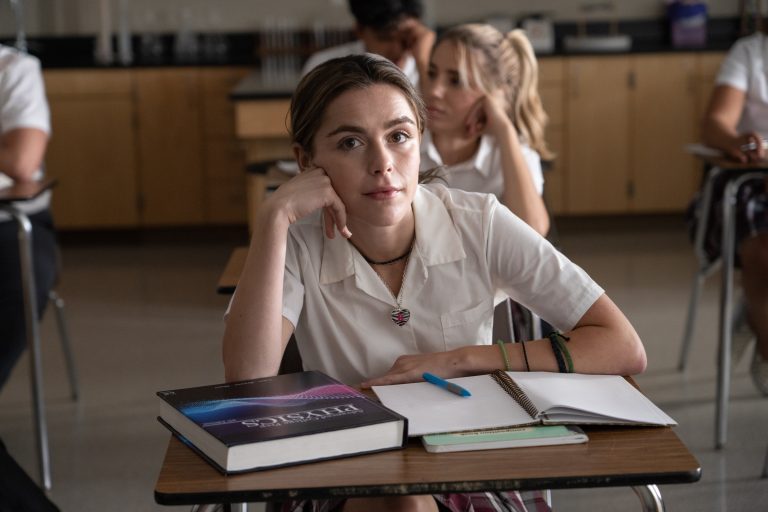“Bonjour Tristesse” (2024) begins on a cozy, comforting note in a sun-drenched town in Europe. It is hard for these early moments not to remind you of Luca Guadagnino’s “Call Me by Your Name,” especially with how it establishes its setting filled with warmth and a sense of relaxation. There is a clear emphasis on making us a part of this world on a sensory level with shots of mundane details around its characters, akin to Yasujirō Ozu’s pillow shots, which furthers the cushy charm of its setting. That is also how writer-director Durga Chew-Bose presents her bourgeois characters, caught in these simple joys of life.
None of them feels a sense of urgency or unrest in the conventional sense. Agreed that these people are there to spend their summer vacation, where rest might just be of the utmost priority. However, that seems unlikely in modern times, in which the film places its characters. Unlike Otto Preminger’s 1958 adaptation of Françoise Sagan’s novel, Chew-Bose’s film shows these characters as 21st-century people. What might be a minor aspect becomes integral to the film. After all, the original text was at least partly about the material comforts that its young protagonist hopes to enjoy no matter what. Her sense of tranquility was also a sign of her family’s social class.
In Chew-Bose’s iteration, these societal aspects are less in focus. In fact, it’s not even a thriller like Preminger’s film, despite revolving around near-identical character archetypes. It shows 18-year-old Cécile (Lily McInerny) enjoying the comforts of a French seaside. Joining her are her widowed father Raymond (Claes Bang) and his romantic partner Elsa (Nailia Harzoune).
They have their own interpersonal dynamic where they rarely feel obliged to be anything but themselves. However, it changes, at least to a degree, when Anne (Chloë Sevigny) decides to show up at their house. To Cécile, that’s a surprise. Raymond tries to ease Cécile into this change in their languorous lives.

As Cécile’s late mother’s close friend, Anne becomes Cécile’s godmother. She isn’t necessarily harsh or blunt, but she is disciplined and honest. Much like Raymond, she is also protective of Cécile, but they have different ways to approach parenting. Raymond allows Cécile to do what she wants without any burden. Anne, however, hopes she will be more careful while she enjoys her life.
These are the kind of details where Chew-Bose’s iteration starkly differs from Preminger’s. While she uses fairly similar events, she offers them through a refreshing change of perspective, which, although expected, is deeply admirable for the way she explores them. In her film, there is no stark contrast between the characters. Their traits are not merely defined by the way others perceive them. In one of the scenes, the film also points out this notion. That conversation introduces Cécile’s desire to present herself to be perceived in a particular way.
Chew-Bose’s screenplay realizes the underlying difference between appearances and truth. She focuses on the inner lives of these four characters and shines by presenting a shared understanding of their internal struggles. So, the characters are not defined by the conventional dichotomy. No single person is good or evil, and the film is farther from being an indictment of their class. Instead, it is a compassionate ode to growing up as these characters make a sincere attempt to understand each other rather than merely observe and judge.
For these reasons, the drama is not as sharp as in Preminger’s adaptation. Written by Arthur Laurents, Preminger’s film showed the world through young Cecile’s eyes, which dramatically justified its heightened sense of thrill. It focused more on the feelings of jealousy, betrayal, heartbreak, and revenge while showing three women trying to be close to a man for their own reasons. Chew-Bose’s adaptation shifts this focus to understanding its female characters better, instead of presenting them as simply as the intense figures in Cecile’s world. It shows Cecile learning similar lessons to the former project, but her portrayal seems more dignified.
As a viewer, you won’t see Cecile as a child but as a person going through a crucial stage of transformation in her life. Her journey into adulthood is presented with reverence for her emotions. So, instead of judging Anne’s penchant for discipline, it shows Cecile’s sincere attempt to figure out its roots. Elsa isn’t just shown as a materialistic woman, latching onto wealth or romance like a person incapable of making decisions for her life. She may not have the brightest responses to the intellectual debates between Anne, Cecile, and Raymond, but her multicultural background allows her a window into aspects that they will experience as outsiders.

Chew-Bose’s script addresses these nuances seldom through dialogue and rather through observation. Even when they discuss matters of their heart, they are less direct. It presents their romantic, emotional, and sexual needs with compassion. Besides, it relies far less on their enmity in general. While the resulting lack of drama takes away its dramatic heft, it is nonetheless disarming.
Chloë Sevigny’s magnetic performance anchors this seemingly breezy but bittersweet drama by being the kind of friend, philosopher, and guide that both Cecile and Raymond need in their lives. She reveals Anne’s sense of sophistication along her internal chasm with an ease and dramatic pull that very few can. Lily McInerny conveys the overwhelming burden of loss and remorse even in the film’s subdued approach.
The cinematography captures the essence of these landscapes while often keeping just the level of distance needed from the characters. The soundtrack choices also capture the mood that can lull you and excite you in the right measures. Overall, Durga Chew-Bose’s “Bonjour Tristesse” may not be the most profound experience of its kind, but it is tender, grounded, and far more resonant than just pretty people in pretty places.




![Bhavesh Joshi Superhero Review [2018]: Not a Great, but an Important Film](https://79468c92.delivery.rocketcdn.me/wp-content/uploads/2018/09/Bhavesh_Joshi_Superhero-768x326.png)
![The Killing of Kenneth Chamberlain [2021] Review : A harrowing true story brought to life by an incredible Frankie Faison](https://79468c92.delivery.rocketcdn.me/wp-content/uploads/2021/12/The-Killing-Of-Kenneth-Chamberlain-1-768x432.jpg)


